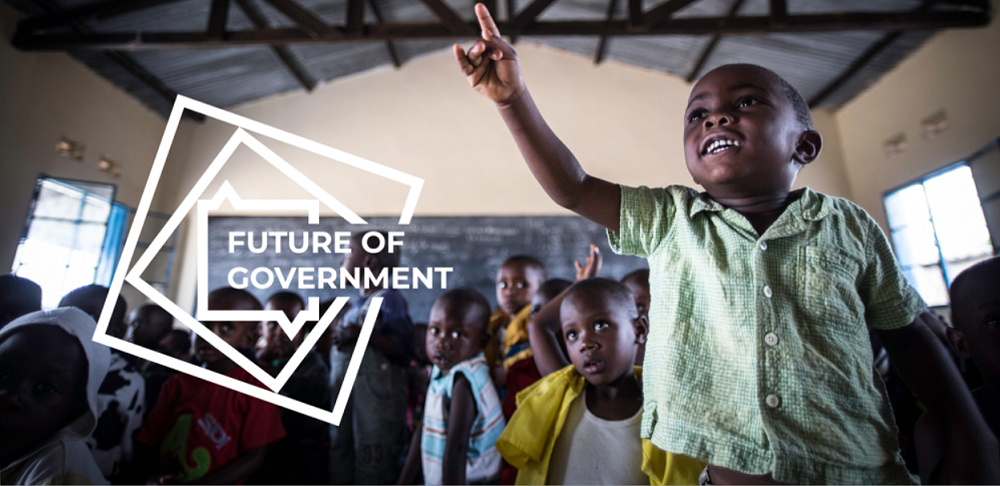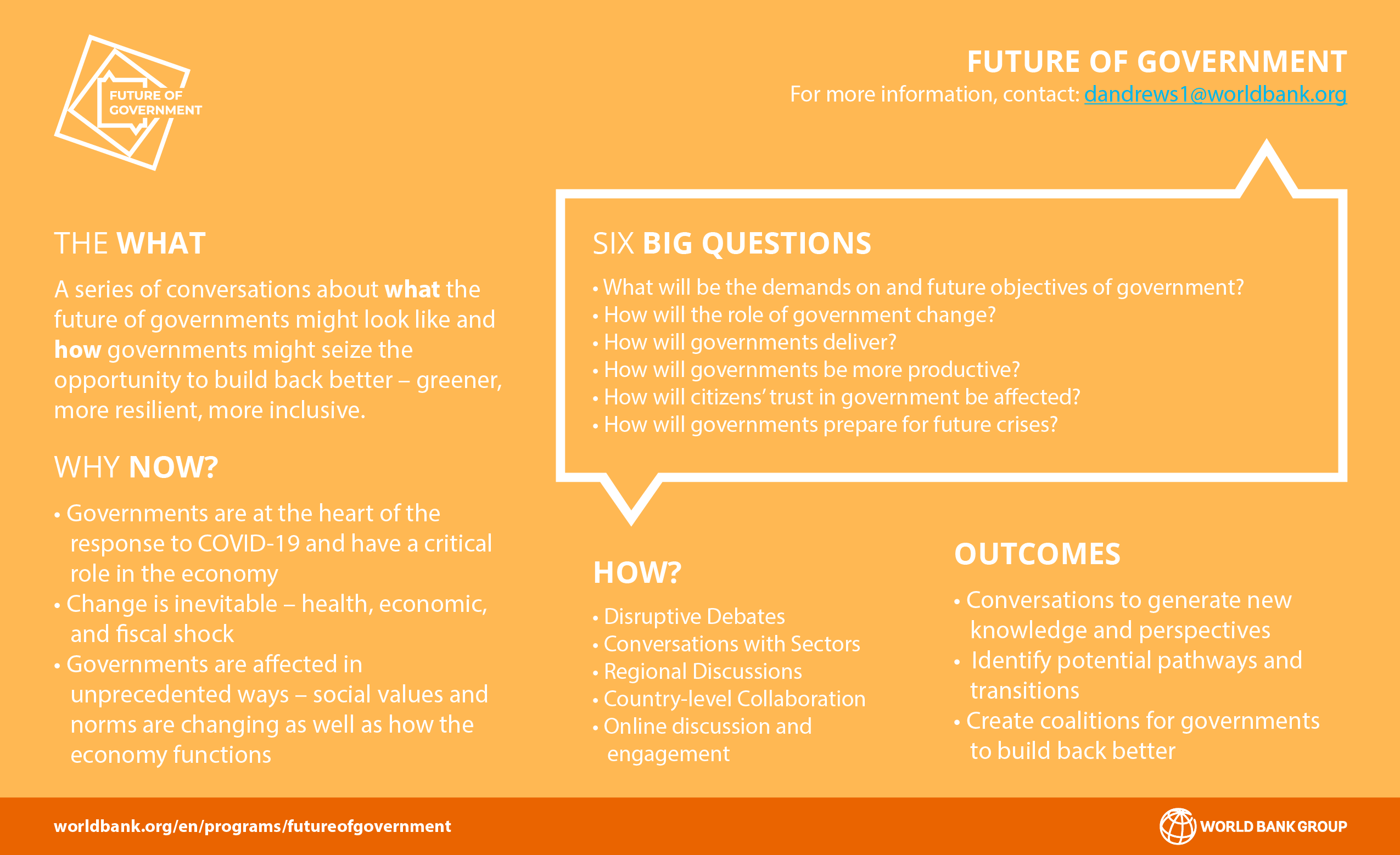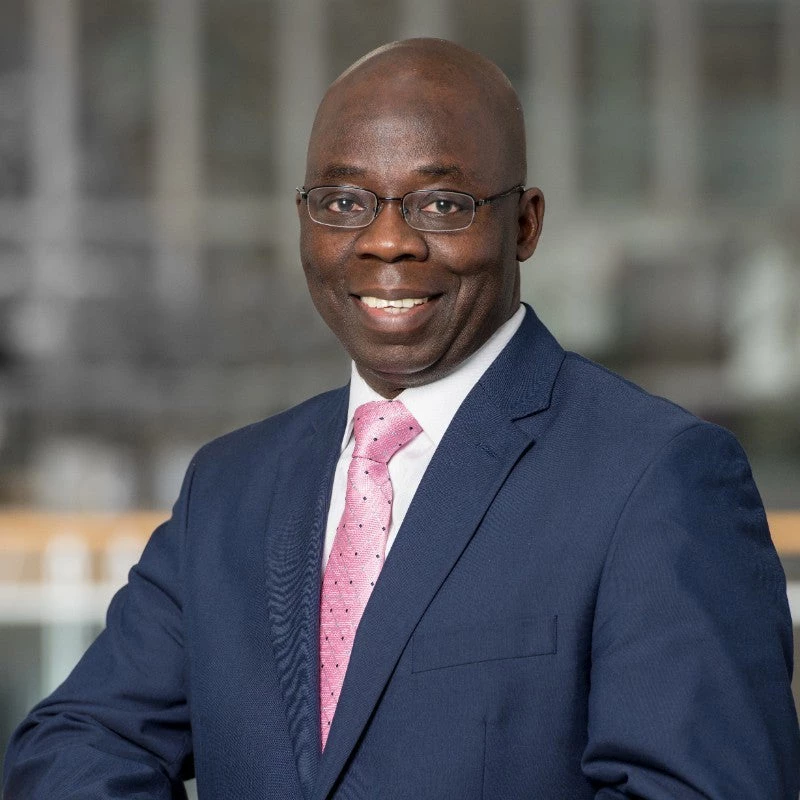 The Future of Government postcard - boy reaching upward, smiling, in classroom
The Future of Government postcard - boy reaching upward, smiling, in classroom
The world is at an inflection point. As we face the unprecedented crisis of COVID-19 and the subsequent health, economic, and fiscal shocks, there are two stark visions for our collective future. The first builds on the progress we were making pre-2020 – a future where people across the world are more secure in their livelihoods, prosperity is shared, and poverty is in decline. The alternative picture is a future that will involve increased uncertainty, inequality, and poverty – at least from global health challenges, climate change, and insecurity. One thing is clear – the actions that governments and multilaterals take in the months and years to come will play a critical role in which direction the world is headed .
Recognizing that poverty and inequality, the challenges brought about by COVID-19, and climate change are interconnected, our approach at the World Bank is to address them simultaneously and systematically through our green, resilient, and inclusive development approach (what we call GRID for short). Last year, we invited people to start a conversation on what governments might look like after the pandemic, and how they might change for good. The World Bank is now launching the Future of Government Initiative to set this conversation in motion.
We will convene a series of disruptive debates and constructive conversations, to be held virtually between May and October 2021, on how governments might change, with the purpose of generating new knowledge and perspectives. Each session of the debates will focus on one of six questions in the top right box below:
These debates will feature a diverse range of speakers and stakeholders, including young leaders from various fields, activists and civil society actors, economists and political thinkers, public sector employees and politicians, as well as businesspeople and entrepreneurs. Over the coming months we will explore how governments, the international community, and the World Bank in particular can support global, regional, and country action to take advantage of opportunities to shape the future. These findings will be summarized in a flagship report that is set to be released in Spring 2022.
Last year, at the launch of this discussion, I posed five important questions on the topic. I have now introduced an additional one – question zero if you like: “what will citizens and businesses demand of government in the future, what will be the future objectives of government”. We need to understand what citizens, civil society, and the private sector might expect, even demand, from their governments in the future. We also need to consider how governments might change their current objectives and methods in response to these demands and expectations.
Replay the live streamed event.
We assembled an exciting set of debaters; Global Teacher prizewinner Ranjitsinh Disale, and Director of Policy at The British Academy and author of the COVID Decade Molly Morgan Jones discussed how the future demands and expectations of government might evolve. Professor Francis Fukuyama from Stanford University's discussed how the future objectives of government may change. The debate of these questions is critical for framing our conversations around the remaining questions in this series, which relate to how governments might change to meet these evolving demands and objectives, with a focus on their role, the ways they deliver, productivity improvement, citizens trust, and preparedness for uncertainty and crisis.
As I mentioned at the beginning of this blog, the world is at an important inflection point. In convening these conversations now on the future of government, I hope we can contribute towards enabling governments to navigate the course towards a brighter, greener, and more resilient future for citizens the world over.
What are your thoughts about the Future of Government? You can contribute to this debate via Twitter @wbg_gov and using the hashtag #FutureOfGovernment; via our website at worldbank.org/futureofgovernment or by simply leaving a comment below.
Looking forward to your contributions!
Blogs in the Future of Government series:
- Starting a conversation about the future of governments post coronavirus, by Ed Olowo-Okere | May 27, 2020
- Understanding what people want from their leaders: the first Future of Government Disruptive Debate, event recap by Donna Andrews, Tim Williamson, & Jacques Rosenberg | May 29, 2021
- What the demands on and future objectives of government mean to me, by President Laura Chinchilla Miranda | May 29, 2021
- How will the role of government change after the pandemic? event recap by Donna Andrews, Tim Williamson, & Marje Aksli | June 25, 2021
- The future of government: a new social contract for the 21st Century? by Kumi Naidoo | July 20, 2021
- How officials can do better at delivering services to citizens, event recap by Alasdair Fraser, Donna Andrews, & Tim Williamson | November 3, 2021
- How to increase government productivity in the post-COVID-19 world, event recap by Jacques Rosenberg, Donna Andrews, & Tim Williamson | November 4, 2021
- Trust— necessary fuel for effective governance, event recap by Donna Andrews, Tim Williamson, Marje Aksli, & Samuel Garoni | January 11, 2022
- The Future of Government: Basic Education and the (limited) role of technology in complex human endeavor by Lant Pritchett | June 23, 2022



Join the Conversation